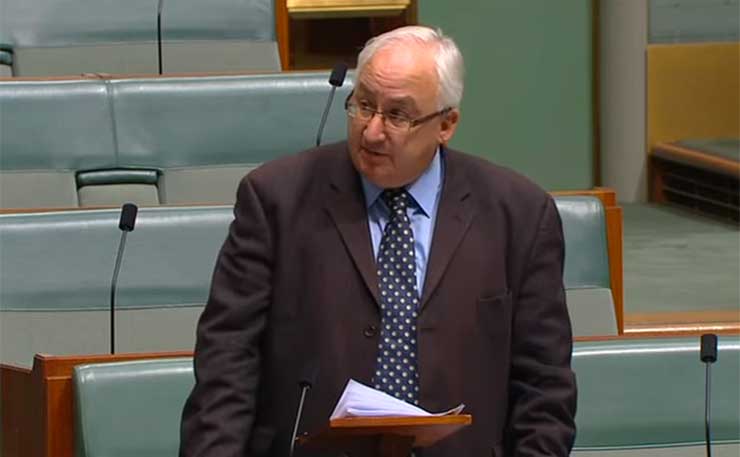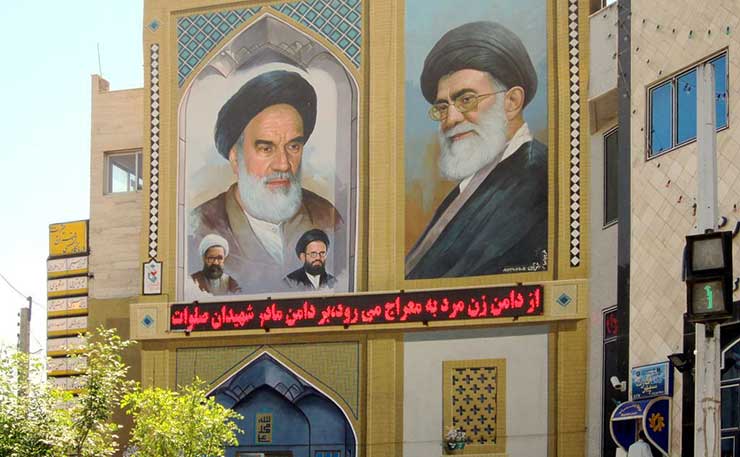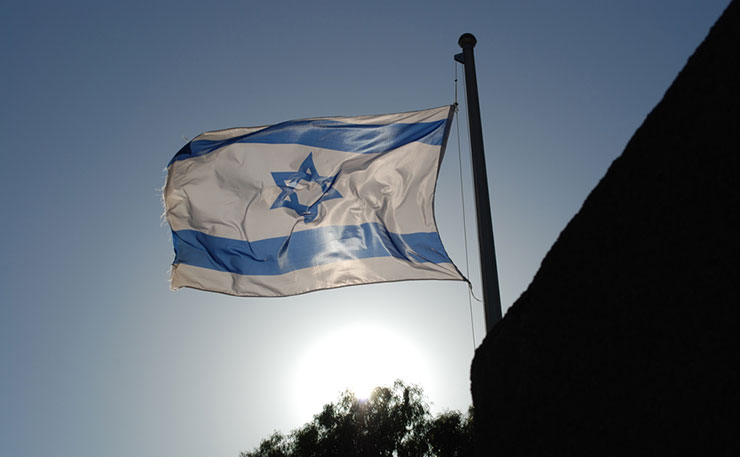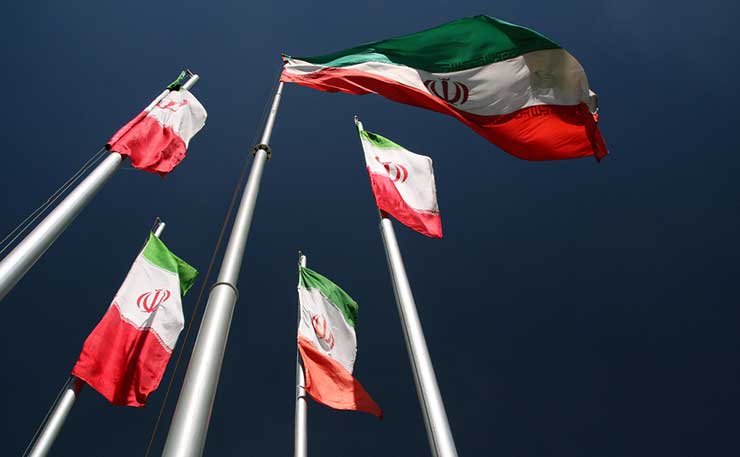In part two of a review of Fairfax coverage of Iran, Michael Brull focuses on the real history of the nation, which stands in stark contrast to the official western spin.
In my previous article, I discussed Hartcher’s gratuitously false claim about Iran breaking international law. This may seem like a minor point. Everyone makes mistakes. Yet I would argue that it’s symptomatic of his methodology more generally. So let us turn to a more extended analysis of his article, and its many problems.
In his article, Peter Hartcher begins by quoting the wisdom of Henry Kissinger – an approach that usefully encapsulates the characteristic flaws of Hartcher’s journalism – explaining that Iran needs to decide if it is a “nation or a cause”.
The “cause” it is supposedly determined to push includes three elements. These are, firstly, spreading the Islamic revolution, the priority of the ayatollahs, by crushing the “Sunni version” practiced by most of its Arab neighbours.
Secondly, there is defying the US, and, thirdly, “the destruction of Israel”.
“All of these elements’ remain in Iranian thinking today. However, their new President, Hassan Rouhani, is a pragmatist, not a fundamentalist. This goes along with major changes in Iranian politics, particularly the nuclear agreement which “transformed politics in Iran”.
Now Iranians don’t believe in confrontation anymore, and Iran may become a nation instead of a cause. However, bucking this trend, the military fired some missiles in a drill “in flagrant disregard of UN security council resolution 1929.”
Hartcher then cites some authorities to bolster his analysis. They include Bishop, and “leading agitator for human rights”, Michael Danby.

Now, there are a few points to make about this. It is not simply that Hartcher ignores just about all of the history of relations between the West, Israel, and Iran – which I will briefly review. It is that Hartcher’s version of reality is extremely myopic and ignorant, and it is myopic and ignorant because it is more or less based on the views of important Australian politicians who each give their side of the story, and that’s all that’s needed to satisfy Hartcher.
This article by Hartcher is reflective of his writing more generally. Instead of investigating issues independently, Hartcher kibitzes with politicians and then uncritically publishes what they tell him. This should be obvious enough from the fact that Hartcher went to Danby for advice, and then presented him as a “human rights advocate”, not as a vessel for whatever the Israeli government says.
And then there’s Hartcher turning to the wisdom of Kissinger, which is its own category of ignorance.
In what follows, I want to address just a few of the issues raised by Hartcher, because he’s not just wrong on many points, but flatly inverts reality. This matters, because Fairfax is regarded as more highbrow, and yet Iran is still portrayed as a country run by crazy ayatollahs obsessed with irrational causes, supposedly based in fundamentalism (as opposed to the surprising arrival of a pragmatist, the other end of Iran’s political spectrum).
Though Hartcher doesn’t call for war, these are the premises of warmongers, who argue that Iran can’t be trusted.
The priority of the Ayatollahs: Crushing Arab neighbours
Take Hartcher’s view that Iran wanted to “crush” the rival form of Sunni Islam of its neighbours, and spread the revolution.
Was this really a priority of Iran?
A year after the Islamic Revolution of 1979, Iran was invaded by Iraq, led by a dictator who Westerners now consider awful, the late Saddam Hussein. After initial success against Iran, the tide turned by 1982.

At this point, as explained by the National Security Archive, the US “began supporting Iraq: measures already underway to upgrade US-Iraq relations were accelerated, high-level officials exchanged visits, and in February 1982 the State Department removed Iraq from its list of states supporting international terrorism.”
Support also came from other Arab countries: “Iraq received massive external financial support from the Gulf states, and assistance through loan programs from the US. The White House and State Department pressured the Export-Import Bank to provide Iraq with financing, to enhance its credit standing and enable it to obtain loans from other international financial institutions. The US Agriculture Department provided taxpayer-guaranteed loans for purchases of American commodities, to the satisfaction of US grain exporters. The US restored formal relations with Iraq in November 1984, but the US had begun, several years earlier, to provide it with intelligence and military support.”
In 1983, Iran “intensified” its complaints about Iraq using chemical weapons against it. America “had intelligence confirming Iran’s accusations, and describing Iraq’s “almost daily” use of chemical weapons, concurrent with its policy review and decision to support Iraq in the war”.
They knew that “Iraq used chemical weapons against Iranian forces, and, according to a November 1983 memo, against ‘Kurdish insurgents’ as well”.
Donald Rumsfeld then toured Iraq, meeting Saddam personally. The US thought Iraq was “extremely pleased” with the visit. In March 1984, the US finally condemned Iraq’s use of chemical weapons. Its support for Iraq, however, continued, and the US even intervened to water down United Nations Security Council action on Iraq’s use of chemical weapons.
Evidence recently emerged that America provided “battlefield intelligence used to launch lethal sarin gas attacks on Iranian troops”.
During the war, America also sold arms to Iran. When the Iran-Contra scandal was exposed, the US tilted further to Iraq, and shot down an Iranian civilian airliner. They refused to apologise.
So, did Iran talk about exporting the Islamic revolution? Sure. But almost 40 years after the revolution, perhaps it is time to notice that it wasn’t the Islamic Republic trying to crush its Arab neighbours, but its Arab neighbours backing an Arab invasion to crush the Islamic Revolution. A brutal invasion, involving the regular use of chemical weapons against Iran.
Defying the US
Backing a war which resulted in hundreds of thousands of dead people and the use of chemical weapons is a pretty good reason for Iranian resentment towards the US. Indeed, considering the US role in the war, describing this as a matter of Iranian “defiance” is at least somewhat strange.
If Mexico invaded America with Russian backing, we would regard the Russians as aggressors, and probably admire American resistance. There is nothing wrong with Iran defending itself from unprovoked aggression, and no country in the world would smile benignly at those who support such aggression.
Yet there is more reason for Iranian “defiance” of the US to make sense. After all, why was there a revolution in 1979 in the first place? Why were they already angry at the US?
The revolution was directed against the Shah, Mohammad Reza Pahlavi. He was the dictator of Iran from 1953. Before then, Iran had a democratically elected leader, Mohammad Mossadegh, a secular nationalist who wanted Iran to control its own oil resources.
As explained by one of the leading historians of Iran, Ervand Abrahamian, this infuriated the British, who were determined to retain control over Iranian oil.
Britain claimed an interest in negotiating, but British officials privately admitted that, “It seems very unlikely we can do anything at all to meet him…. We must keep effective control. We have explored a number of devices by which we could disguise this hard fact but found nothing that was not either too dangerous or too transparent for even the Persians to accept”. The Foreign Office explained that “Control of that asset is of extreme importance”.
British intelligence agency MI6 successfully conspired with the CIA to overthrow Mossadegh and install the Shah. It took 60 years for the CIA to finally admit it was involved in the coup.
The Brits knew the coup would install “an authoritarian regime”, and the Americans knew what type of regime this was. As British historian Mark Curtis showed, American officials wrote that, “The Shah has consolidated all power under his personal authority and suppressed all real opposition”. This was in a context of “near feudal economic and social conditions”. Many people “find Iran’s antiquated and feudal structure and the privileges of the ruling classes anachronistic in a modern world”.
Amnesty said that Iran under the Shah had the “highest rate of death penalties in the world, no valid system of civilian courts and a history of torture which is beyond belief. No country in the world has a worse record in human rights than Iran.”
Iran’s secret police, SAVAK, was created with CIA support, and had close ties to the CIA and Israel’s Mossad. No less significantly, from 1972 to 1979, the US sold the Shah $21 billion in arms.
Why 1972? This is where Peter Hartcher’s deep thinker comes in. As explained by Kissinger biographer Greg Grandin, “it was Kissinger who, in 1972, greatly deepened the relationship between Washington and Tehran. He was the one who began a policy of unconditional support for the Shah as a way to steady American power in the Persian Gulf while the US extracted itself from Southeast Asia.”
Kissinger “overrode State Department and Pentagon objections and gave the Shah what no other country had: the ability to buy anything he wanted from US weapons makers.” The Shah wanted to buy a navy, he said in 1973, so “Kissinger let him buy a navy.”
By 1976, the last full year of Kissinger, “Iran had become the largest purchaser of American weaponry and housed the largest contingent of US military advisors anywhere on the planet. By 1977, the historian Ervand Abrahamian notes, “the shah had the largest navy in the Persian Gulf, the largest air force in Western Asia, and the fifth-largest army in the whole world”.
In 1978, protests against the Shah culminated in his overthrow the following year. Grandin comments that, “A number of high-ranking Middle East policymakers and experts held Kissinger directly responsible for the disaster, especially career diplomat George Ball, who called Kissinger’s Iran policy an ‘act of folly.’”
After the revolution, “the ayatollahs were the beneficiaries of Kissinger’s arms largess, inheriting billions of dollars of warships, tanks, fighter jets, guns, and other material. It was also Kissinger who successfully urged the Carter administration to grant the Shah asylum in the United States, which hastened the deterioration of relations between Tehran and Washington, precipitating the embassy hostage crisis”.
With a record like that – putting aside Kissinger’s pro-genocidal record in East Timor and Bangladesh, and the devastation of Vietnam and Cambodia – it beggars belief that Hartcher can turn to Kissinger – Henry Kissinger! – for insight on Iran.
Destroying Israel
Hartcher claims that one of Iran’s causes is destroying Israel. Once again, this is a matter of looking at foreign policy purely through the lens of what politicians tell him, and official rhetoric.
It is true that Islamic Republic of Iran has a long record of aggressive rhetoric towards Israel. For example, in his brilliant book Treacherous Alliances, Iran expert Trita Parsi writes that, “Iran made numerous attempts to expel Israel from the United Nations, sponsored a children’s drawing and writing contest on the theme ‘Israel Must Be Erased from the Earth’ in various Islamic countries, and pledged to send Iraqi prisoners of war to fight Israel in Lebanon.”

In 1981, Supreme Leader Grand Ayatollah Ruhollah Khomeini declared that “ever since we began this affair, this movement, one of our most important issues was that Israel should be eliminated.”
In March 1994, Parsi writes, “a slight majority of Iran’s 270 parliamentarians signed a statement ‘stressing the need for the annihilation of Israel from the world map’, arguing that the Palestinian issue wouldn’t be settled except through armed struggle against Israel.”
How serious was this rhetoric? Well, not very. Whilst Iran has given some support to small groups that have engaged in guerrilla warfare and terrorist attacks against Israel, it has taken no measures to destroy Israel. During the Iran-Iraq War, Israel sold weapons to Iran.
The record is reviewed in Parsi’s book. He explains that “Iran’s rhetoric against Israel did not match its actual policy. At the same time that Iran was secretly dealing with the government of Israel, it was openly condemning the Jewish state and questioning its right to exist.”
He quotes an Iranian expert explaining that, “A key pillar of the revolutionary government’s foreign policy was ‘rhetorical opposition to Israel but practical collaboration… with the Jewish State.’” During the war, “Iran collaborated secretly with Israel on security matters, and, on the other, it took its rhetorical excesses against Israel to even higher levels to cover up its Israeli dealings.”
This was done for political gain. The “revolutionaries utilised the unpopularity of the Jewish State among the Arab populace to advance Iran’s status in the Muslim world and reduce the threats it faced from the Arabs.”
They thought that, “The more anti-Israel Iran appeared the more sympathy it would win among the Arab populations and the more difficult it would be for the Arab governments to challenge and oppose Iran”. Yet, “all in all, Iran purchased over $500 million worth of arms from Israel in the 1980-1983 period, according to the Jaffee Institute for Strategic Studies at Tel Aviv University. Most of it was paid for through deliverance of Iranian oil to Israel.”
In private, Ayatollah Khomeini explained his views on Israel and Palestine. In Parsi’s words, Khomeini explained that:
The Israeli-Palestinian conflict was primarily a Palestinian issue. At the second level, it should involve the Arab states neighbouring Israel, and only at the third level should it involve Iran and other Islamic states. As a result, Iran should never be more involved in the conflict than the Palestinians themselves and their Arab neighbours, and Iran should not be a frontline state against Israel.
Direct confrontation with the Jewish state should be left to the Palestinians themselves and their immediate Arab neighbours… Khomeini also told his associates that in the event of an agreement between the Palestinians and the Israelis, Iran should lend its support to the agreement by standing behind the Palestinians.
Was Israel privy to that private conversation? No. But considering that it sold $500 million in arms to Iran, it clearly wasn’t too concerned by Iranian rhetoric anyway, and saw it for what it was.
Parsi observes that, “Contacts between Iran and Israel were frequent throughout the 1980s”.
This is borne out in official Israeli declarations at the time. For example, in 1987, Israel’s then Minister for Defence, Yitzhak Rabin, said that “Iran is Israel’s best friend and we do not intend to change our position in relation to Tehran, because Khomeini’s regime will not last forever.”
It wasn’t until 1992 that Labour politicians like Shimon Peres and Rabin started returning Iran’s inflammatory rhetoric, saying that Iran was “insane” and so on. Parsi comments that, “Even lobbyists supporting Israel recognised that “not much” had changed with Iran during the five short years when Rabin went from calling Tehran a strategic friend to his warnings of the Persian menace.”
Back then, Likud, led by Binyamin Netanyahu, didn’t fall into Labour’s demonisation of Iran. But from 1997, he started using the same language of the threat of Iran.

It is hard not to conclude that Israel’s rhetoric of fearing the Persian menace is just as cynical as Iran’s rhetoric of destroying Israel.
Iran’s rhetoric has fluctuated since its peak of aggression in the ‘80s, as it was colluding under the table with Israel. Under Ahmadinejad, Iran issued ugly rhetoric about Israel, along with revolting anti-Semitic speeches. Yet in May 2003, Iran sent a proposal for a “grand bargain” to the US, expressing a willingness to negotiate on a range of issues.
These included stopping material support for Palestinian groups, pressuring them to “stop violence action against civilians within borders of 1967”, pushing Hezbollah to disarm and thus become a “mere political organisation within Lebanon”, and accepting the Arab League Beirut declaration: the “Saudi initiative, two states approach”.
The Bush administration rejected this proposal, presumably expecting the war on Iraq to be the “cakewalk” its favoured experts predicted. As Normal Finkelstein reported, Iran went on to vote in favour of a resolution endorsing the Beirut declaration at the Organisation of the Islamic Conference in 2009.
In the event of a two-state agreement in line with the international consensus, this would entail recognising Iran and establishing normal relations with it.
Yes, Ahmadinejad was still President at the time. Thus, whatever one thinks of Iranian rhetoric about Israel, decades of Iranian policy suggest that it is not a particularly accurate barometer of Iranian goals.
Those wacky fundamentalists
Iran scholar Ervand Abrahamian argued in his book Khomeinism: Essays on the Islamic Republic that Khomeinism shouldn’t be regarded as fundamentalism, but as populism.
Abrahamian explains that fundamentalism “implies religious inflexibility, intellectual purity, political traditionalism, even social conservatism, and the centrality of scriptural-doctrinal principles.”
Populism, on the other hand “is associated with ideological adaptability and intellectual flexibility, with political protests against the established order, and with socioeconomic issues that fuel mass opposition to the status quo.”
Khomeinism “should be seen as a flexible political movement expressing socio-economic grievances, not simply as a religious crusade obsessed with scriptural texts, spiritual purity, and theological dogma”.
Thus, whilst striving to overthrow the Shah, Ayatollah Khomeini “adopted radical themes, inflamed social antagonisms, promised to redistribute wealth, and appealed blatantly to class sentiments… At times he sounded more radical than the Marxists. But while adopting radical themes, he remained staunchly committed to the preservation of middle-class property. This form of middle-class radicalism again made him akin to Latin American populists, especially the Peronists.”
However, whilst in power, “the behaviour of Khomeini and the Islamic Republic has been determined less by scriptural principles than by immediate political, social and economic needs. The more we dig under the surface, the less we find of fundamentalism and the more of pragmatic – even opportunistic – populism.”
Thus, whilst trying to rally the masses, Khomeini issued “highly radical, populist catchphrases”, which were “remarkably vague on specifics”.
These include:
“Islam belongs to the oppressed, not to the oppressors.
Islam is for equality and social justice.
Islam represents the slum dwellers, not the palace dwellers.
Islam will eliminate class differences.
We are for Islam, not for capitalism and feudalism.
Islam originates from the masses, not from the rich.
In a truly Islamic society, there will be no shantytowns.
The poor were for the Prophet; the rich were against him.
Oppressed of the world, unite.”
On the question of women’s suffrage, for years Khomeini “argued that women’s suffrage was un-Islamic.” As circumstances changed, he “argued that to deprive women of the vote was un-Islamic.”
In 1979, “the Islamic regime, to prove its radical credentials and appropriate the leftist tradition, celebrated May Day with much fanfare and revolutionary rhetoric.” Within a decade, May Day didn’t produce “street rallies and freewheeling mass meetings but highly controlled and carefully orchestrated indoor shows designed to drum up support for the regime”.
Likewise for Khomeini’s class struggle rhetoric.
“In 1979-82,” Abrahamian writes, “at the height of the revolution, he equated Islam with social justice, especially fair income distribution. He praised the oppressed, the barefooted, and the shantytown poor, and denounced the oppressors, the rich, the greedy palace dwellers, and their foreign patrons.”
And then, “after 1982, as Iran’s Thermidor began, he equated Islam with respect for private property, described the bazaar as an essential pillar of society, and emphasised the importance of government as well as law and order.”
By 1993, the regime:
“openly declare[d]its support for open-door laissez-faire policies. It has relaxed price controls and import restrictions, lifted rationing from many goods, decreased subsidies for a number of commodities, reduced inflation by cutting back on expenditures, increased wage and salary differences, set up a stock exchange, narrowed the gap between the official and the black-market exchange rate for the dollar, encouraged the importation of consumer goods, re-established free-trade zones in the Persian Gulf, and privatised over 500 companies, factories and agribusinesses that had been nationalised in 1979-80.”
That is, Khomeini, “like populists the world over, modified his rhetoric depending on political circumstances”.
When many Westerners see the robes and beards of the mullahs who rule Iran, they assume that religious nuts are in charge. How can you reason with people like that?
Yet the domestic and foreign policies pursued by Ayatollah Khomeini – the leading figure of the Islamic Revolution and Islamic Republic – suggest that Iran’s fundamentalism isn’t just a matter of poring over scriptures. In foreign policy, the Islamic Republic talked about destroying Israel, whilst sending it oil for weapons.
In domestic policy, Khomeini talked about social justice, eliminating class differences and shantytowns, until the revolution was secured.
Those who are surprised that Iran would negotiate an end to the sanctions regime simply didn’t pay much attention to Iran. The Islamic Republic has not been a story of fundamentalists until Rouhani. Plenty of religious fundamentalists are pragmatic, inside and outside of Iran. That includes much of the political elite of Iran since the revolution.
But let us return to Hartcher. If he read a book or two, his picture of Iran would presumably be radically different.
Instead, he chats to a couple of politicians, and consults the wisdom of Kissinger. Yet the political spectrum extends beyond the ALP and the Liberals, and there is a world of knowledge outside of these politicians.
There are even some who might say that Kissinger is an ignorant war criminal whose opinions should be shunned in decent society.
Yet it is the respectability of consulting these figures that makes Hartcher’s journalism respectable.
This kind of centrist respectability may build a career, and appear sensible. Yet it can also be a sign of unthinking adoption of an unjust status quo, and the false claims of an unjustified political consensus.
Donate To New Matilda
New Matilda is a small, independent media outlet. We survive through reader contributions, and never losing a lawsuit. If you got something from this article, giving something back helps us to continue speaking truth to power. Every little bit counts.





